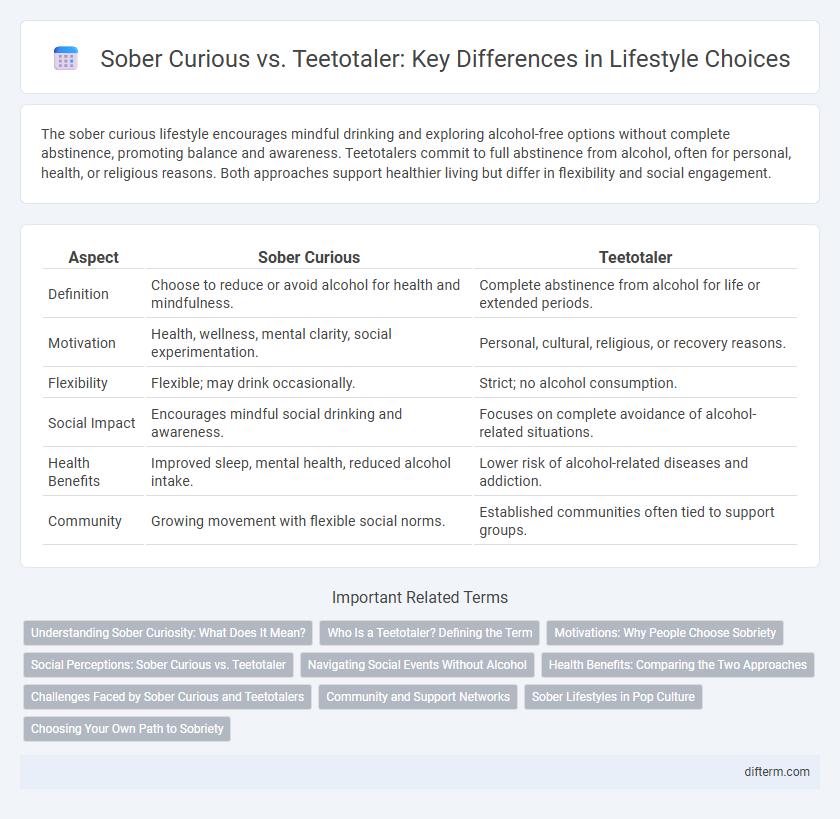The sober curious lifestyle encourages mindful drinking and exploring alcohol-free options without complete abstinence, promoting balance and awareness. Teetotalers commit to full abstinence from alcohol, often for personal, health, or religious reasons. Both approaches support healthier living but differ in flexibility and social engagement.
Table of Comparison
| Aspect | Sober Curious | Teetotaler |
|---|---|---|
| Definition | Choose to reduce or avoid alcohol for health and mindfulness. | Complete abstinence from alcohol for life or extended periods. |
| Motivation | Health, wellness, mental clarity, social experimentation. | Personal, cultural, religious, or recovery reasons. |
| Flexibility | Flexible; may drink occasionally. | Strict; no alcohol consumption. |
| Social Impact | Encourages mindful social drinking and awareness. | Focuses on complete avoidance of alcohol-related situations. |
| Health Benefits | Improved sleep, mental health, reduced alcohol intake. | Lower risk of alcohol-related diseases and addiction. |
| Community | Growing movement with flexible social norms. | Established communities often tied to support groups. |
Understanding Sober Curiosity: What Does It Mean?
Sober curiosity refers to a lifestyle choice where individuals intentionally reduce or eliminate alcohol consumption to explore its impact on mental clarity, physical health, and social interactions without committing to lifelong abstinence. Unlike teetotalers, who strictly avoid alcohol for personal, cultural, or religious reasons, sober curious people often approach sobriety flexibly, focusing on mindfulness and well-being. This movement emphasizes self-awareness and experimentation with sobriety as a tool for enhancing overall life quality rather than adhering to rigid rules.
Who Is a Teetotaler? Defining the Term
A teetotaler is an individual who completely abstains from consuming alcoholic beverages, often for personal, health, or religious reasons. Unlike the sober curious who experiment with reducing alcohol intake to enhance wellbeing, teetotalers maintain strict avoidance of alcohol at all times. This lifestyle choice reflects a deliberate commitment to sobriety and can foster improved physical health and mental clarity.
Motivations: Why People Choose Sobriety
People choose sobriety for various motivations, with sober curious individuals often seeking mindfulness, improved mental clarity, and better physical health without fully committing to abstinence. Teetotalers typically adopt lifelong avoidance of alcohol due to personal, religious, or health reasons, emphasizing total abstinence. Both groups prioritize well-being, but sober curious people focus on exploring sobriety as a lifestyle choice rather than a strict rule.
Social Perceptions: Sober Curious vs. Teetotaler
Social perceptions of the sober curious often emphasize mindfulness and flexibility, attracting individuals exploring moderation without rigid commitment. Teetotalers, identified by complete abstinence from alcohol, are sometimes perceived as more disciplined but may face social misunderstanding or stereotyping. Both lifestyles challenge traditional drinking norms, reshaping social interactions and expectations around alcohol consumption.
Navigating Social Events Without Alcohol
Sober curious individuals consciously choose to reduce or eliminate alcohol without fully committing to lifelong abstinence, often exploring social events with alternative beverage options and mindfulness techniques. Teetotalers maintain a strict, permanent avoidance of all alcoholic drinks, prioritizing clear boundaries and often preparing strategies such as bringing their own non-alcoholic beverages or steering conversations to alcohol-free topics. Understanding these approaches empowers effective navigation of social occasions by balancing personal goals with social dynamics.
Health Benefits: Comparing the Two Approaches
Sober Curious individuals explore reduced alcohol consumption to improve mental clarity, sleep quality, and overall wellness without complete abstinence. Teetotalers maintain total alcohol avoidance, gaining benefits such as lower risks of liver disease, cardiovascular conditions, and certain cancers. Both approaches enhance health outcomes by reducing alcohol-related harm, but the teetotaler lifestyle offers more comprehensive protection through full abstinence.
Challenges Faced by Sober Curious and Teetotalers
Sober curious individuals often face social pressure and misunderstandings as they navigate occasional abstinence without fully committing to permanent sobriety. Teetotalers encounter challenges such as limited social acceptance and the need to constantly explain their lifelong choice to abstain from alcohol. Both groups grapple with maintaining connections in environments where drinking is deeply ingrained in cultural and social rituals.
Community and Support Networks
The Sober Curious movement fosters a flexible community where individuals explore reducing alcohol without strict abstinence, promoting open conversations and shared experiences. Teetotaler communities often emphasize complete abstinence, providing strong, structured support networks rooted in shared commitment to lifelong sobriety. Both groups offer valuable emotional support and accountability, but Sober Curious networks typically encourage inclusivity and experimentation, while teetotaler groups focus on maintaining consistent, long-term alcohol-free lifestyles.
Sober Lifestyles in Pop Culture
Sober curious individuals explore alcohol-free living as a lifestyle choice, often influenced by wellness trends and mental health awareness showcased in pop culture. Teetotalers commit to complete abstinence from alcohol for personal, religious, or health reasons, representing a more traditional and disciplined approach. Popular media increasingly highlights sober curious journeys, reflecting a cultural shift towards mindful drinking and self-care.
Choosing Your Own Path to Sobriety
Sober curious individuals explore reducing alcohol for health and mindfulness without full abstinence, while teetotalers commit to complete, lifelong sobriety often for personal or cultural reasons. Choosing your own path to sobriety means understanding personal motivations, social influences, and wellness goals to craft a sustainable lifestyle change. Embracing either approach empowers self-awareness and intentional living tailored to individual needs and values.
Sober Curious vs Teetotaler Infographic

 difterm.com
difterm.com